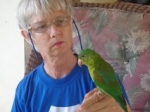And we're back to this: Why do you think your machine is not protecting you?PEF wrote:I have been reading some research that Dr. Krakow has been doing on xPAP and sleep onset insomnia. I have a strong feeling that what he describes is the REAL reason for my severe sleep onset insomnia. This is because, although with my new sleep routine, it has improved, but that has happened many times before. Sooner or later my sleep onset insomnia will return, it always does. I have been aware for the last 10 years or so that I am really afraid to fall asleep. But I was never able to figure out why. I have used many protocols to overcome this fear involving sleeping pills, meditations, relaxation techniques. But they always fail eventually. The severe anxiety always comes back. I believe this is because my brain knows it is in fact dangerous for me to fall asleep. It also knows that my machine is not protecting me.
And: What data would convince you that your machine is doing its job of protecting you?
And: Is it possible that your brain has not yet totally accepted the idea that your machine is doing its job and that the machine IS protecting you when you are asleep?
Because here's the thing: If your conscious mind has decided that your machine is not capable of protecting your body from UARS, then your unconscious mind is going to have a very tough time learning to trust the machine enough to not wake up/arouse frequently out of fear that something bad might be happening---even though all the data you've posted indicates that your machine does a good job of protecting you from the flow limitations and RERAs that mark untreated or under treated UARS.
Again, what is your evidence that your current machine is not addressing your UARS? What machine do you think you would need to address UARS?I have come to the following conclusions about my therapy:
1. Although I feel slightly better, it has been a failure.
2. I need much higher pressure but cannot tolerate it.
3. I believe that, if my xPAP therapy was successfully addressed, it may actually cure my sleep-onset insomnia.
4. My sleep-onset insomnia is directly CAUSED by my OSA/UARS.
5. My machine is not addressing my UARS. These machines are not designed for that.
Please understand me: I do think that Dr. Krakow's Sound Sleep, Sound Mind is a worth while book. But his theories about treating UARS with have not been adequately tested and there are many in the sleep medicine community who disagree with him on UARS. Indeed, the real problem right now with UARS is that there is a whole lot of disagreement within the sleep medicine community about the definition of UARS, the proper way to diagnose UARS, and the proper way(s) to treat UARS.
Treatment of upper airway resistance syndrome in adults: Where do we stand? is an interesting peer reviewed article published in 2015; it gives a good account of just how messy the whole situation concerning UARS is. The upshot seems to be that most sleep doctors now do recognize UARS as a form of sleep disordered breathing. CPAP is the most widely studied treatment for UARS, but UARS patients appear to have more problems with becoming and staying compliant with CPAP. Why this is so needs to be investigated, but anecdotally UARS patients seem to see less immediate relief of symptoms than moderate-to-severe OSA patients, and that fact may make it more difficult for UARS patients to become and stay compliant with PAP therapy. But the study also states that "there are no randomized controlled trials evaluating this type of treatment (CPAP) in UARS patients" so no one really knows whether CPAP (or xPAP) can be scientifically demonstrated to be effective in treating the symptoms of UARS.
The question becomes: Is the fragmented sleep from untreated/under treated UARS? Or is the fragmented sleep caused by the sensory stimuli coming directly from the PAP therapy rather than untreated/under treated UARS? Or something else?During the times when my sleep-onset insomnia is improved, all that happens is that I develop the fragmented sleep type that wakes me up often during the night. That is what I have now.
It is interesting to note that in Treatment of upper airway resistance syndrome in adults: Where do we stand? the authors mention prescription sleep medication that can consolidate sleep might be a useful adjuvant therapy in treating UARS patients with fragmented sleep while on CPAP. Oral appliances may also be a effective way to treat UARS, but again, there don't seem to be any studies that verify that idea scientifically.










